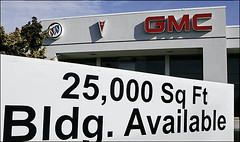Changing economic paradigms
I have been thinking with the economic downturn that at least four industries are totally screwed, because their economic models are based on factors that are now changed.
1. Professional Sports. Recently I read something in a paper about how sports teams are relatively insulated economically. This might be true for the major leagues, but minor sports are at risk, such as the announcement that the Arena Football League will suspend the 2009 season. And NASCAR is having a hard time retaining sponsors as well.
Longer term I think we will have to see major changes. High salaries for players have been supported by sponsorship agreements (i.e., $100 million for naming rights for stadiums) and high-value television broadcasting agreements. These monies will dry up as businesses consolidate and as advertising revenues for television and radio decline.
And will economically strapped cities, counties, and states really be able to justify massive financial support of sports teams through the financing of new stadiums and arenas?
2. Newspapers. Today in my e-box I got a notice that the Detroit News will move to home delivery of the newspaper only two days/week. (The Detroit Free Press, which I used to deliver as a child from 7th to 11th grades, will be delivered three days/week, including Sunday.) And the papers will shift to mostly digital. Newspapers cost more to create content, print and deliver than the per issue price. They were subsidized by advertisers, mostly locally-based, who bought ads to reach subscribers.
In fact, the first sentence of a typical media economics textbook is "the business of media is to provide audiences to advertisers."
Many industries that newspapers have relied up for advertising have become national rather than local, and many businesses have been consolidated (department stores, banks, supermarkets, office supply, other clothing and retail stores, appliance stores, car dealerships, stock brokerages), leaving far fewer potential advertisers available to spend money on local advertising.
And this doesn't even consider the impact of the Internet on readership of the print edition, and the difficulty of raising significant revenues from online advertising sales.
The Post announced a price increase to 75 cents for a daily copy yesterday...
3. Television. It has the same problem with loss of advertising and viewers that newspapers have, but it's a bit different. Automobile advertising is one of the most significant sources of revenue for national broadcasting companies as well as local television stations. That money is drying up. Already it has impacted early afternoon daily serial programming "soaps," which has relied on local television advertising support from car dealers, the same businesses that are now closing across the country.

AP photo.
4. Museums, arts organizations, and other nonprofits. Again, such organizations rely on the largesse of big companies--which are consolidating and/or going out of business--and rich people, who are losing money, even if they aren't victims of fraud.
Business models that rely on forms of sponsorship are going to face major dislocation over the next couple years. It's going to be ugly. We call this exogenous shock.
Labels: building a local economy, economic development, media, urban revitalization



0 Comments:
Post a Comment
<< Home